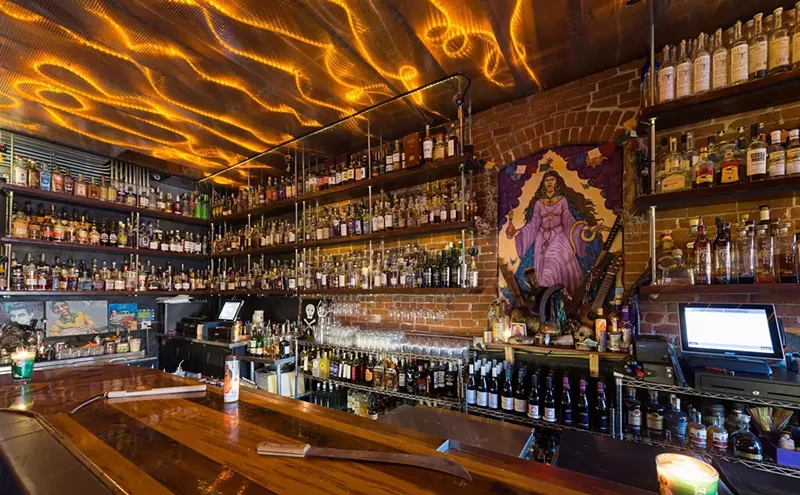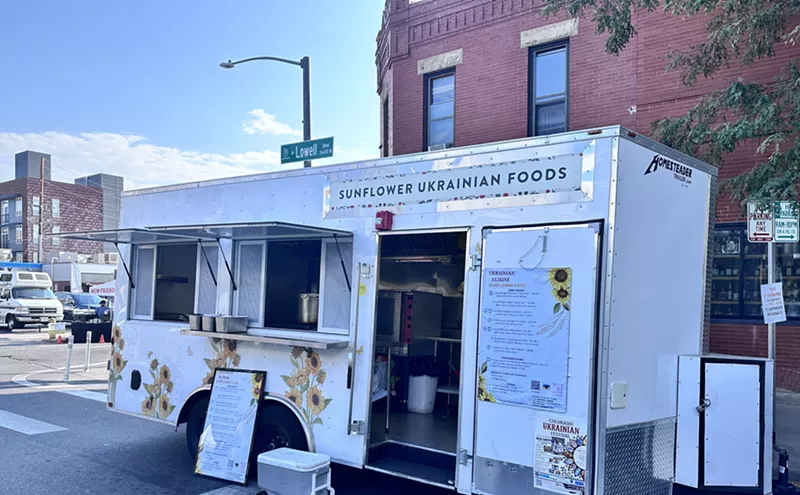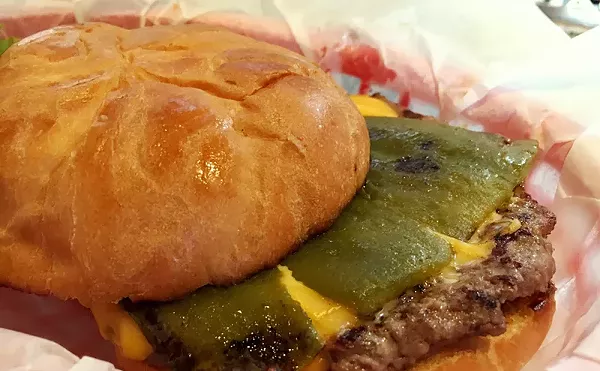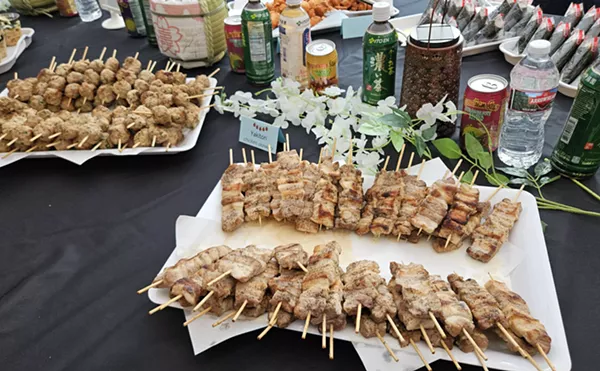A Missouri native with a family background in beef and sausage-making, Jewsbury launched Custom Corned Beef in north Denver in 1977. "People here didn't hardly know what corned beef was," he remembers. Denver was short on the Jewish and Irish diners who typically consume corned beef -- and Jewsbury's Gentile heritage didn't help (although his surname may have given him some beefy credibility).
"To most people, corned beef comes in a can from Argentina," says Doug Jewsbury, who took over with his wife, Linda, when his dad retired three years ago.
Custom Corned Beef has done its best to carve away at that perception by making quality corned beef. According to plant manager Al Bandin, the company will sell about 600,000 pounds of beef this year to Nobel/Sysco, Shamrock and other local restaurant suppliers. That's proof that diners have learned that corned beef is what's for dinner around the calendar, not just on St. Patrick's Day.
Corned beef got its name for the large kernels of salt -- "corns" -- that were massaged into the meat to preserve it. References to the sodium-enhanced flesh first appear in Irish literature from the thirteenth century, when corned beef was a delicacy for Irish royalty who could afford both salt and eating cows, which were used mainly for milk at the time. Irish immigrants brought the concept to America, boiling the meat with potatoes and cabbage for a working-class dish.
Boiling the meat strips the beef of its salty goodness, though. "We've had a hard time convincing people they shouldn't boil it," the elder Jewsbury says. He suggests that his company's corned beef be cooked at 300 degrees or less, in a rack over a layer of water in a covered pan, for 45 minutes per pound. When it's fork-tender, the beef gets sliced across the grain.
Custom prepares corned beef three ways. The staple is uncooked, brined beef that starts with fresh, hand-trimmed beef briskets that are injected with a mix of saltwater, spices and nitrites for curing, then put in a vacuum tumbler for four hours in 2,000-pound lots. The vacuum pulls the brine deep into the meat and speeds up the curing process; the tumbling helps tenderize the meat. After that, the briskets are steeped in brine for three days. Pre-tumbler, the process took five times as long. "We had a couple big wooden barrels in the cooler with saltwater and seasonings," John Jewsbury remembers. "All the briskets would go in those barrels, and they'd just soak there."
A portion of Custom's briskets are steam-cooked for six hours to create a convenience food for restaurants. Other briskets are dusted with black pepper and spices, then steamed in a mist of atomized liquid smoke for six hours to make a toothy, smoke-flavored pastrami. The company's product line also includes frozen corned-beef hash that comes in pre-portioned servings.
When John Jewsbury pulls a reheated brisket of pre-cooked beef from his office microwave, the smell is enough to tempt the toughest deli shopper. The meat is a glorious mulled-magenta color, and it sports an assertive level of pickled saltiness, the flavors of coriander and other spices, and aged-beef character. Moments after it hits the plate, a handful of Custom's twenty staffers sneak into the office for samples. "Ours has a little more flavor than the others," Bandin says.
John agrees: "Some of it, you close your eyes, you wouldn't know what you were eating."
Carol, his wife, says that a rep for Vienna Beef, one of the nation's largest corned-beef dealers, told her that he'd "rather cut against anybody else but us."
Loren Lippit, a salesman for Cadco Ltd., a Connecticut-based company that manufactures a patented convection and steam oven, discovered Custom beef at a trade show in Denver. "I put a piece in my mouth," he recalls, "and ten steps later, it was, 'Wow, what did I just put in my mouth?'" He now uses Custom corned beef for his oven demos on the East Coast. "It has a depth of flavor, lots of layers, and it's not overly salty," he says. "It tickles the daylights out of me to go to a New York show and talk to deli owners who are raving about the corned beef. And I get to tell them, 'I get that from Denver.' People go crazy over it."
Chris Fuselier's Blake Street Tavern is one of Custom's few direct-to-retail customers. "It's the best corned beef in town," says Fuselier. Not only does the meat have more flavor than the competition -- Blake Street's Reubens could be the best in town -- but Fuselier gets to deal with a neighborhood company, since Custom moved its operations to Walnut Street, in what's now the Ballpark neighborhood, back in the '80s. "Half the battle there is getting the right meat," Fuselier says. "And it's nice to buy from a local vendor instead of some corporate giant."
Those giants enjoy economies of scale that Custom can't match. "They have the means and the deep pockets," Doug Jewsbury says, "but we have the quality and the service. There's still a spot for us, and we don't want to sell truckloads. We're making a living, which is all we've ever asked for." And now a third generation -- Doug's son, Keith -- is making a living in the family business. They do it the old-fashioned way: with a quality product.
"I hear from a lot of customers who say they haven't had any good corned beef since they left New York," Doug says. "And a lot of people say ours is better."












